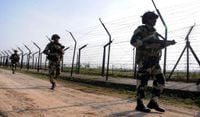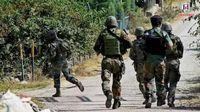Srinagar, May 8 — Tensions along the Line of Control (LoC) in Jammu and Kashmir escalated dramatically as Pakistani troops engaged in unprovoked ceasefire violations for the 14th consecutive day, resulting in a wave of violence that has left communities on edge. Just a day after a deadly barrage claimed the lives of 13 civilians and one Indian soldier, the situation intensified with further shelling across multiple sectors.
According to reports from the Indian Army, the latest ceasefire breaches occurred during the night of May 7-8, specifically targeting areas opposite Kupwara, Baramulla, Uri, and Akhnoor. “On the night of 07-08 May 2025, Pakistan Army posts engaged in unprovoked firing using small arms and artillery across the LoC,” the Army stated. Fortunately, no casualties were reported from this latest round of cross-border shelling.
The violence on May 7 was particularly severe, following India's targeted strikes on terror hideouts in Pakistan and Pakistan-occupied Kashmir. This retaliation came in response to the Pahalgam massacre, where 26 civilians, including a Nepali national, were killed by terrorists in a brutal attack on April 22. The loss of life on May 7 included 13 individuals, among them four children, and left dozens injured in the Poonch sector due to relentless Pakistani shelling.
In the aftermath of these events, the Indian Army launched Operation Sindoor, which involved precision missile strikes on nine terror camps in Pakistan, including strongholds of groups like Lashkar-e-Taiba and Jaish-e-Mohammed. This operation, which began at 1:05 am on May 7, lasted for about 25 minutes and reportedly resulted in the deaths of approximately 70 terrorists, with 60 others injured. According to Defence Minister Rajnath Singh, the operation was executed with minimal collateral damage, a claim that has received backing from various political leaders.
In a meeting held on May 8, Singh briefed leaders of all political parties on the operation, who expressed their support for the government's military decisions. The Defence Minister stated, “At least 100 terrorists were killed in Indian strikes under Op Sindoor.” This statement underscores the government's commitment to addressing the threat posed by terrorism in the region.
As the situation remains volatile, the Indian Air Defence systems have been actively intercepting attempts by Pakistani forces to target Indian military sites. Reports indicate that on the night of May 7, Pakistan attempted to strike 15 Indian military locations, but these efforts were thwarted. In retaliation, the Indian forces targeted the Pakistani air defence system in Lahore, further escalating the conflict.
On the morning of May 8, explosions were reported as Indian air defence units intercepted Pakistani drones in Udhampur, Jammu and Kashmir. The ongoing military exchanges have prompted local authorities to take precautionary measures, including the closure of educational institutions across five border districts: Jammu, Kathua, Samba, Rajouri, and Poonch.
The local administration has also established 24/7 control rooms in all ten districts of the Jammu region to manage the crisis effectively. Hundreds of residents from border areas have begun relocating to safer regions, as the threat of further shelling looms large. Many families have taken refuge in underground bunkers or moved to other safer locations, fearing for their safety amid the ongoing violence.
As the conflict continues unabated, the Indian Army has reiterated its commitment to responding proportionately to any ceasefire violations. The Army's statement emphasized that they will continue to protect civilians while ensuring operational readiness against any threats from across the border.
In the wake of the escalating violence, the chief ministers of various states, including Rajasthan's Bhajanlal Sharma, have convened high-level meetings to assess the situation and formulate responses to the ongoing crisis. The situation remains fluid, with military officials closely monitoring developments along the LoC.
As both nations grapple with the rising tensions, the international community is watching closely, hoping for a resolution to the ongoing conflict that has claimed so many lives and displaced countless families. The recent surge in violence underscores the fragile state of peace in the region, which has been marred by decades of conflict.
The Pahalgam attack, one of the deadliest in recent memory, has reignited fears of terrorism in Jammu and Kashmir, a region that has long been a flashpoint between India and Pakistan. With both sides now on high alert, the potential for further escalation remains a pressing concern for both military leaders and civilians alike.
As this story develops, updates will continue to emerge, highlighting the ongoing struggle for peace and security in a region that has seen too much bloodshed.



